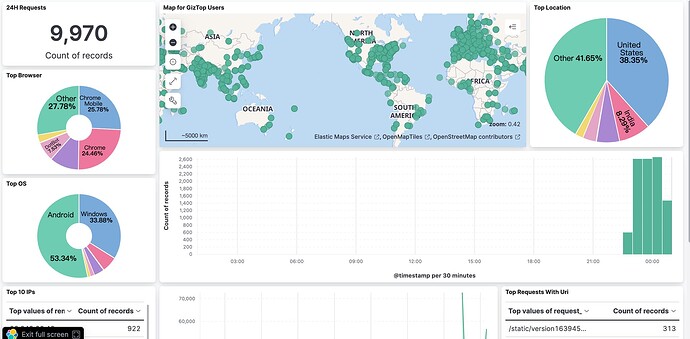简易可视化效果图
前言
Magento 2.3 之后就默认依赖了 elasticsearch
elastic stack 是非常强大的一款日志及搜索平台,如果仅仅用来跑Magento的搜索是很不划算的
在这里我教大家如何把nginx json格式的日志,直接打到ES里,并用Kibana进行可视化分析
市面上的教程基本上是通过了logstash进行的,我搜索了一整天的资料和观看官方文档,终于解决了filebeat直接打数据到ES的问题,在这里给大家做个分享。
Why Json
ELK套件实际是是可以直接分析Nginx的原始日志的,但是json除了更利于人观看之外,更多的是我对nginx的原始日志不太满意,做了更多的定制化在内,比如XFF,POST参数(因nginx默认不支持,这里不多做介绍)等等
Nginx日志的生命周期
Nginx → Nginx Json Logs → filebeat(采集) → pipeline(清洗) → elasticsearch(存储) → Kibana(可视化)
开始配置
第一步: Nginx
首先编辑Nginx的nginx.conf文件, 增加Nginx日志的Json格式到http块:
log_format json escape=json '{"@timestamp":"$time_iso8601",'
'"server_addr":"$server_addr",'
'"remote_addr":"$http_x_forwarded_for",'
'"scheme":"$scheme",'
'"request_method":"$request_method",'
'"request_uri": "$request_uri",'
'"request_length": "$request_length",'
'"uri": "$uri", '
'"request_time":$request_time,'
'"body_bytes_sent":$body_bytes_sent,'
'"bytes_sent":$bytes_sent,'
'"status":"$status",'
'"upstream_time":"$upstream_response_time",'
'"upstream_host":"$upstream_addr",'
'"upstream_status":"$upstream_status",'
'"host":"$host",'
'"http_referer":"$http_referer",'
'"http_user_agent":"$http_user_agent"'
'}';
这里有个坑,配置完了之后不是马上生效,需要在对应的vhost log的配置里把 json 这个字符串加进去,这样才会按照 json 这个格式进行记录
Example:
access_log /var/log/nginx/magentochina.org-access.log json;
编辑完nginx配置文件之后, 可以需要先reload或者restartnginx,然后尝试 tail 一下nginx的日志,是否生效
第二步: pipeline
需要在es上新建一个pipeline, 配置文件如下:
PUT _ingest/pipeline/nginx_json_logs_transfor
{
"description": "Pipeline for parsing Nginx access logs. Requires the geoip and user_agent plugins.",
"processors": [
{
"set": {
"field": "event.ingested",
"value": "{{_ingest.timestamp}}"
}
},
{
"remove": {
"field": "ecs"
}
},
{
"set": {
"copy_from": "@timestamp",
"field": "event.created"
}
},
{
"user_agent": {
"field": "http_user_agent",
"ignore_missing": true
}
},
{
"geoip": {
"field": "remote_addr",
"target_field": "source.geo",
"ignore_missing": true
}
},
{
"geoip": {
"database_file": "GeoLite2-ASN.mmdb",
"field": "remote_addr",
"target_field": "source.as",
"properties": [
"asn",
"organization_name"
],
"ignore_missing": true
}
},
{
"rename": {
"field": "source.as.asn",
"target_field": "source.as.number",
"ignore_missing": true
}
},
{
"set": {
"field": "event.kind",
"value": "event"
}
},
{
"append": {
"field": "event.category",
"value": "web"
}
},
{
"append": {
"field": "event.type",
"value": "access"
}
}
],
"on_failure": [
{
"set": {
"field": "error.message",
"value": "{{ _ingest.on_failure_message }}"
}
}
]
}
第三步: filebeat配置
配置filebeat读取nginx文件
filebeat.inputs:
# Each - is an input. Most options can be set at the input level, so
# you can use different inputs for various configurations.
# Below are the input specific configurations.
- type: log
# Change to true to enable this input configuration.
enabled: true
# Paths that should be crawled and fetched. Glob based paths.
paths:
- /var/log/nginx/magentochina.com-access.log
# - /var/log/nginx/access.log
#- c:\programdata\elasticsearch\logs\*
fields:
log_source: nginx
log_type: www
index: nginx
fields_under_root: true
tags: ["nginx","magentochina"]
json:
keys_under_root: true
overwrite_keys: true
以上的配置是告诉filebeat log文件在哪里,并且把日志按json格式进行处理
配置Kibana和Elasticsearch
setup.kibana:
# Kibana Host
# Scheme and port can be left out and will be set to the default (http and 5601)
# In case you specify and additional path, the scheme is required: http://localhost:5601/path
# IPv6 addresses should always be defined as: https://[2001:db8::1]:5601
host: "10.108.0.7:5601"
# 这填写自己的Kibana service地址
# ---------------------------- Elasticsearch Output ----------------------------
output.elasticsearch:
# Array of hosts to connect to.
hosts: ["10.108.0.7:9200"]
pipeline: "nginx_json_logs_transfor"
indices:
- index: "magento-nginx-%{+yyyy.MM.dd}"
when.equals:
fields:
index: "nginx"
第四步: 配置Kibana
配置索引数据
配置可视化
注意
- 注意: 不要打开filebeat的nginx modules模块,那是为默认nginx日志服务的
- 最好不要把
Magento 搜索索引和日志放在一个库 - 这是一个轻量化方案,日志比较多的情况下请多研究一下
- 不要在生产环境上直接操作,先测试好
- 部分内容空了再来补
